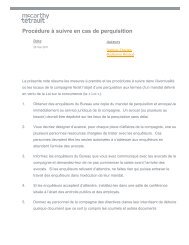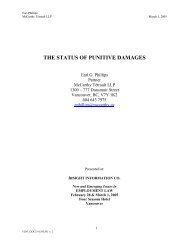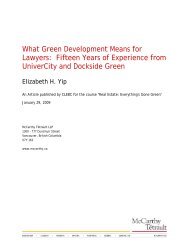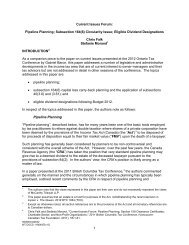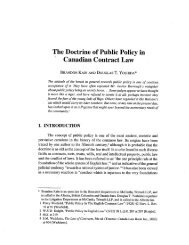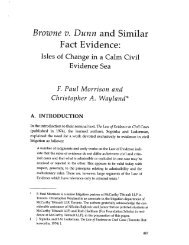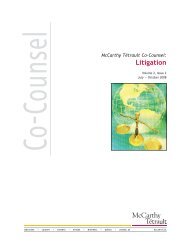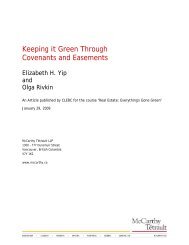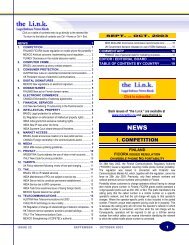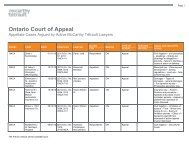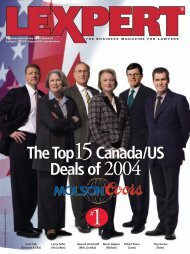Nationality and the ITAR: Implementation ... - McCarthy Tétrault
Nationality and the ITAR: Implementation ... - McCarthy Tétrault
Nationality and the ITAR: Implementation ... - McCarthy Tétrault
You also want an ePaper? Increase the reach of your titles
YUMPU automatically turns print PDFs into web optimized ePapers that Google loves.
<strong>Nationality</strong> <strong>and</strong> <strong>the</strong> <strong>ITAR</strong>: <strong>Implementation</strong><br />
Challenges <strong>and</strong> Opportunities in Canada <strong>and</strong><br />
<strong>the</strong> United States<br />
Thomson Reuters - Federal Publications<br />
Seminars<br />
John W. Boscariol<br />
October 19, 2011<br />
John W. Boscariol, International Trade <strong>and</strong> Investment Law Group, <strong>McCarthy</strong> Tétrault LLP / mccarthy.ca
1<br />
Today’s Focus<br />
¬ Canada’s Controlled Goods Program (CGP)<br />
¬ US International Traffic in Arms Regulations (<strong>ITAR</strong>)<br />
¬ final <strong>ITAR</strong> Rule on dual- <strong>and</strong> third-country nationals<br />
(<strong>ITAR</strong> 126.18)<br />
¬ how will <strong>the</strong> US <strong>and</strong> Canadian rules work toge<strong>the</strong>r?<br />
<strong>McCarthy</strong> Tétrault LLP / mccarthy.ca
2<br />
Canada’s Controlled Goods Program<br />
¬ domestic industrial security program<br />
¬ administered by <strong>the</strong> Controlled Goods Directorate<br />
(CGD) (part of Public Works <strong>and</strong> Government<br />
Services Canada)<br />
¬ background <strong>and</strong> history<br />
¬ relationship with U.S. <strong>ITAR</strong> <strong>and</strong> “Canadian exemption”<br />
<strong>McCarthy</strong> Tétrault LLP / mccarthy.ca
3<br />
Canada’s Controlled Goods Program (cont’d)<br />
¬ CGP applies to:<br />
¬ most Export Control List (ECL) Group 2 munition items<br />
¬ ECL item 5504 (strategic goods & US <strong>ITAR</strong> basket) –<br />
includes non-military items – satellite systems,<br />
propulsion <strong>and</strong> space-related equipment<br />
¬ ECL Group 6 items (missile)<br />
<strong>McCarthy</strong> Tétrault LLP / mccarthy.ca
4<br />
Canada’s Controlled Goods Program (cont’d)<br />
¬ key CGP obligations<br />
¬ registration required in order to examine,<br />
possess or transfer a controlled good<br />
¬ maintain security<br />
¬ prevent unauthorized transfers, examinations<br />
<strong>McCarthy</strong> Tétrault LLP / mccarthy.ca
5<br />
So We Have Controlled Goods, What Now?<br />
¬ as a CGP registrant, you must:<br />
¬ perform a “security risk management<br />
assessment”<br />
¬ develop <strong>and</strong> implement a written security plan<br />
¬ appoint a Designated Official<br />
¬ maintain records <strong>and</strong> supporting documentation<br />
¬ provide training programs <strong>and</strong> security briefings<br />
¬ advise CGD of any security breaches<br />
<strong>McCarthy</strong> Tétrault LLP / mccarthy.ca
6<br />
So We Have Controlled Goods, What Now?<br />
(cont’d)<br />
¬ Designated Official (DO) must<br />
¬ submit to a security assessment by CGD<br />
¬ conduct, with consent, security assessments of individuals<br />
requiring access to controlled goods or technology<br />
¬ determine extent to which individual poses risk of violation<br />
¬ make <strong>and</strong> keep individual evaluations of honesty, reliability<br />
<strong>and</strong> trustworthiness<br />
¬ authorize extent to which individuals may examine, possess,<br />
transfer controlled goods or technology<br />
¬ submit applications to CGD for temporary workers / visitors to<br />
access controlled goods or technology<br />
<strong>McCarthy</strong> Tétrault LLP / mccarthy.ca
7<br />
Who Can Access Controlled Goods at Your<br />
Facility?<br />
¬ access to your controlled goods <strong>and</strong> technology<br />
will be limited to:<br />
¬ officers, directors <strong>and</strong> employees authorized by DO<br />
¬ temporary workers or visitors (not Canadian citizens or<br />
residents) proposed by DO <strong>and</strong> authorized by CGD<br />
¬ contractual workers that are <strong>the</strong>mselves registered or<br />
employees of registered firm<br />
¬ officers, directors <strong>and</strong> employees of US companies<br />
registered under <strong>ITAR</strong><br />
<strong>McCarthy</strong> Tétrault LLP / mccarthy.ca
8<br />
What About Exporting a Controlled Good or<br />
Technology?<br />
¬ exporting most controlled goods items from<br />
Canada for end-use in <strong>the</strong> United States does<br />
not require a permit<br />
¬ exporting controlled goods items to o<strong>the</strong>r<br />
destinations<br />
¬ must apply to DFAIT’s Export Controls Division<br />
for export permit <strong>and</strong> provide evidence of<br />
registration under CGP<br />
<strong>McCarthy</strong> Tétrault LLP / mccarthy.ca
9<br />
Compliance Issues<br />
¬ non-compliance attracts penalties of up to $2 million per day <strong>and</strong> 10<br />
years imprisonment<br />
¬ possible enforcement action<br />
¬ Voluntary Disposal<br />
¬ Negotiated Compliance<br />
¬ Warning Letter<br />
¬ Formal Hearing<br />
¬ Suspension or Cancellation of Registration<br />
¬ Detention <strong>and</strong> Removal<br />
¬ Prosecution<br />
¬ no prosecutions yet<br />
<strong>McCarthy</strong> Tétrault LLP / mccarthy.ca
10<br />
Canadian Human Rights vs. <strong>ITAR</strong><br />
¬ original problem<br />
¬ compliance with US <strong>ITAR</strong> licensing requirements<br />
¬ in order to benefit from <strong>ITAR</strong> 126.5 “Canadian exemption”,<br />
transfers of technical data <strong>and</strong> defence services must be to<br />
Canadian registered persons<br />
¬ exemption unavailable if “dual national” of a proscribed country, including<br />
those holding citizenship or perhaps born <strong>the</strong>re<br />
¬ terms of TAA or MLA approved by State may allow transfers<br />
only to certain “dual nationals”<br />
¬ compliance may require Canadian companies to determine<br />
citizenship, country of origin/birth, exclude access to certain<br />
areas, projects<br />
¬ may also require application for license or TAA/MLA amendments<br />
<strong>McCarthy</strong> Tétrault LLP / mccarthy.ca
11<br />
Canadian Human Rights vs. <strong>ITAR</strong> (cont’d)<br />
¬ problem if <strong>the</strong> employee was born in or holds citizenship in<br />
certain proscribed countries<br />
¬ in order to comply, companies in Canada may be required to<br />
determine country of birth, citizenship of employees<br />
¬ if licence denied, required to restrict individual’s access to <strong>the</strong><br />
controlled goods, technology or software<br />
¬ denial of employment<br />
¬ denial of advancement, training opportunities<br />
<strong>McCarthy</strong> Tétrault LLP / mccarthy.ca
12<br />
Canadian Human Rights vs. <strong>ITAR</strong> (cont’d)<br />
¬ prima facie breach of Canadian human rights law, if on basis of<br />
citizenship or country of origin:<br />
¬ terminate an employee<br />
¬ deny employment<br />
¬ restrict access to training<br />
¬ treat o<strong>the</strong>rs preferentially<br />
¬ promotions<br />
¬overtime<br />
¬ scheduling<br />
¬ also - asking about citizenship, nationality, country of birth<br />
<strong>McCarthy</strong> Tétrault LLP / mccarthy.ca
13<br />
Canadian Human Rights vs. <strong>ITAR</strong> (cont’d)<br />
¬ possible defence to a complaint<br />
¬ bona fide occupational requirement<br />
¬ rule is rationally connected to job performance<br />
¬ adopted in honest <strong>and</strong> good faith belief that it is necessary<br />
¬ reasonably necessary <strong>and</strong> impossible to accommodate<br />
without imposing undue hardship<br />
¬ no case law re compliance with discriminatory laws<br />
¬ drug testing policy – accommodate to point of undue<br />
hardship<br />
<strong>McCarthy</strong> Tétrault LLP / mccarthy.ca
14<br />
Canadian Human Rights vs. <strong>ITAR</strong> (cont’d)<br />
¬ examples of conflicts (<strong>ITAR</strong>)<br />
¬ General Motors Defense (2007 – Ontario Human Rights<br />
Commission)<br />
¬ complaints by six employees, Canadian citizens or l<strong>and</strong>ed<br />
immigrants, citizenships of third countries (<strong>ITAR</strong><br />
proscribed states)<br />
¬ employees sent home with pay, restricted <strong>the</strong>ir access to<br />
information, reassignments<br />
¬ settled, including monetary remedies<br />
¬ employer to make “all reasonable efforts to secure such<br />
lawful permission as may be obtained to minimize any<br />
differential treatment”<br />
<strong>McCarthy</strong> Tétrault LLP / mccarthy.ca
15<br />
Canadian Human Rights vs. <strong>ITAR</strong> (cont’d)<br />
¬ examples of conflicts (<strong>ITAR</strong>) (cont’d)<br />
¬ Bell Helicopter (2008 – Quebec Human Rights<br />
Commission)<br />
¬ complainant born in Haiti, Canadian citizen for<br />
30 years<br />
¬ applied for <strong>and</strong> hired on internship <strong>and</strong> training<br />
¬ subsequently denied internship because of <strong>ITAR</strong><br />
rules<br />
¬ claim for damages settled<br />
<strong>McCarthy</strong> Tétrault LLP / mccarthy.ca
16<br />
Canadian Human Rights vs. <strong>ITAR</strong> (cont’d)<br />
¬ Québec Human Rights Commission<br />
¬ “reiterates its opposition to <strong>the</strong> application of <strong>the</strong> <strong>ITAR</strong> rules in<br />
Québec because of <strong>the</strong>ir discriminatory impact”<br />
¬ “<strong>the</strong>y include requirements that are inconsistent with <strong>the</strong> Québec<br />
Charter of Human Rights <strong>and</strong> Freedoms”<br />
¬ “can no longer accept that companies established in Québec<br />
submit to foreign rules that infringe on <strong>the</strong> values <strong>and</strong> rights of<br />
citizens as recognized by <strong>the</strong> National Assembly”<br />
¬ “following <strong>the</strong> political developments in this matter attentively …<br />
any person that believes that his or her rights have been<br />
infringed by <strong>the</strong> application of <strong>the</strong> <strong>ITAR</strong> rules may rely on <strong>the</strong><br />
services of <strong>the</strong> Commission”<br />
<strong>McCarthy</strong> Tétrault LLP / mccarthy.ca
17<br />
Proposed <strong>ITAR</strong> Revisions<br />
¬ March 10, 2010 U.S. Administration announcement<br />
¬ revise <strong>ITAR</strong>s to eliminate <strong>the</strong> need for a separate license for<br />
foreign persons with dual- or third-country origins or<br />
nationality employed by a company, government, or<br />
international organization that is a recipient of USML exports<br />
¬ “danger of diversion to a proscribed destination does not<br />
come from dual- or third-country national who may have a<br />
relationship with a proscribed destination <strong>and</strong> who may have<br />
gained inadvertent access to U.S. technology, but ra<strong>the</strong>r from<br />
a foreign government, company or organization that would<br />
deliberately sanction such access”<br />
¬ “begin to st<strong>and</strong>ardize <strong>the</strong> licensing treatment of dual- <strong>and</strong><br />
third-country nationals under <strong>the</strong> U.S. Munitions <strong>and</strong> U.S.<br />
dual-use export control systems”<br />
<strong>McCarthy</strong> Tétrault LLP / mccarthy.ca
18<br />
The New <strong>ITAR</strong> Rule (<strong>ITAR</strong> 126.18)<br />
¬ May 16, 2011 final rule – effective August 15, 2011<br />
¬ no approval from <strong>the</strong> US State Department Directorate of Defense Trade<br />
Controls (DDTC) required for <strong>the</strong> transfer of defence articles, including<br />
technical data, to a foreign business entity, foreign government entity, or<br />
international organization that is an approved end-user or consignee for those<br />
items,<br />
¬ “including <strong>the</strong> transfer to dual nationals or third-country nationals who are<br />
bona fide, regular employees, directly employed by <strong>the</strong> foreign business<br />
entity”<br />
¬ transfer must take place completely within <strong>the</strong> territories where <strong>the</strong> end-user<br />
is located or where <strong>the</strong> consignee operates, <strong>and</strong> must be within <strong>the</strong> scope of<br />
an approved export license, o<strong>the</strong>r export authorization, or license exemption<br />
¬ <strong>the</strong> recipient of <strong>the</strong> defence article is required to have in place “effective<br />
procedures to prevent diversion” to destinations, entities, or for purposes<br />
o<strong>the</strong>r than those authorized by <strong>the</strong> applicable export licence or o<strong>the</strong>r<br />
authorization<br />
<strong>McCarthy</strong> Tétrault LLP / mccarthy.ca
19<br />
New <strong>ITAR</strong> Rule (<strong>ITAR</strong> 126.18) (cont’d)<br />
¬ “effective procedures to prevent diversion” - Canadian firms that are<br />
consignees or end-users of <strong>the</strong> defence articles must ei<strong>the</strong>r:<br />
¬ require a security clearance approved by <strong>the</strong> Canadian<br />
government for its employees or<br />
¬ implement a screening process for <strong>the</strong>ir employees <strong>and</strong> execute<br />
Non-Disclosure Agreements that provide assurances that<br />
employees will not transfer any information to persons or entities<br />
unless specifically authorized by <strong>the</strong> employer<br />
¬ must screen all employees who are to access controlled items<br />
for "substantive contacts" with <strong>the</strong> 25 restricted or prohibited<br />
countries under <strong>ITAR</strong> — including China, Vietnam, Haiti, Cuba,<br />
Venezuela <strong>and</strong> o<strong>the</strong>r countries subject to U.S. military sanctions<br />
<strong>McCarthy</strong> Tétrault LLP / mccarthy.ca
20<br />
New <strong>ITAR</strong> Rule (<strong>ITAR</strong> 126.18) (cont’d)<br />
¬ what are “substantive contacts”?<br />
¬include:<br />
¬ regular travel to those countries<br />
¬ recent or continuing contact with agents, brokers <strong>and</strong><br />
nationals of those countries<br />
¬ continued demonstrated allegiance to those countries<br />
¬ maintenance of business relationships with persons from<br />
those countries<br />
¬ maintenance of a residence in those countries<br />
¬ receiving salary or o<strong>the</strong>r continuing monetary compensation<br />
from those countries<br />
¬ acts o<strong>the</strong>rwise indicating a risk of diversion<br />
<strong>McCarthy</strong> Tétrault LLP / mccarthy.ca
21<br />
New <strong>ITAR</strong> Rule (<strong>ITAR</strong> 126.18) (cont’d)<br />
¬ if an employee is determined to have “substantive<br />
contacts” with persons from <strong>the</strong> <strong>ITAR</strong>-restricted or<br />
prohibited countries, this is presumed to raise a risk of<br />
diversion "unless DDTC determines o<strong>the</strong>rwise“<br />
¬ o<strong>the</strong>r requirements<br />
¬ technology security/clearance plan that includes<br />
procedures for screening employees’ substantive contacts<br />
¬ maintaining records of same for five years<br />
¬ technology security/clearance plan <strong>and</strong> screening records<br />
to be made available to DDTC or its agents for civil or<br />
criminal law enforcement upon request<br />
<strong>McCarthy</strong> Tétrault LLP / mccarthy.ca
22<br />
How Does Canada’s Controlled Goods<br />
Program Work With <strong>ITAR</strong> 126.18?<br />
¬ problem: <strong>the</strong> final <strong>ITAR</strong> rule does not contain<br />
an explicit exemption for companies that are<br />
registered under <strong>and</strong> comply with CGP<br />
¬ CGD’s Enhanced Security Strategy – starting<br />
October 1, 2011<br />
<strong>McCarthy</strong> Tétrault LLP / mccarthy.ca
23<br />
How Does Canada’s Controlled Goods<br />
Program Work With <strong>ITAR</strong> 126.18? (cont’d)<br />
¬ key elements of Enhanced Security Strategy<br />
¬ new Security Assessment Application<br />
¬ unique identification (fingerprinting, criminal record check)<br />
¬ credit report in “circumstances with cause”<br />
¬ DO to use confidential “risk matrix”<br />
¬ nature <strong>and</strong> substance of contacts will be used to determine if an<br />
individual should be subject to broader security assessment or denied<br />
registration<br />
¬ where risk threshold is exceeded, CGD, working with a number of o<strong>the</strong>r<br />
govt departments, will undertake a risk assessment of <strong>the</strong> individual to<br />
determine whe<strong>the</strong>r access should be granted<br />
¬ security assessments must be done every five years<br />
¬ six-month reporting on all who have been security assessed<br />
¬ individuals owning greater than 20% of registrant must be security<br />
assessed by CGD but DO does identity verification<br />
<strong>McCarthy</strong> Tétrault LLP / mccarthy.ca
24<br />
How Does Canada’s Controlled Goods<br />
Program Work With <strong>ITAR</strong> 126.18? (cont’d)<br />
¬ <strong>the</strong> new Security Assessment Application<br />
¬ now at http://ssi-iss.tpsgc-pwgsc.gc.ca/pdf/dmc-cgd/dmccgd-es-sa.pdf<br />
¬ focus on sensitive <strong>and</strong> personal information regarding:<br />
<strong>McCarthy</strong> Tétrault LLP / mccarthy.ca<br />
¬ travel frequency, duration <strong>and</strong> location<br />
¬ “significant <strong>and</strong> meaningful” associations<br />
¬ criminal history<br />
¬ financial issues<br />
¬ Privacy Act statement: consent to disclosure “to law<br />
enforcement <strong>and</strong> o<strong>the</strong>r government departments <strong>and</strong><br />
agencies, including foreign governments, which conduct<br />
checks <strong>and</strong>/or investigations in accordance with Memor<strong>and</strong>a<br />
of Underst<strong>and</strong>ing (MOUs) established with Public Works <strong>and</strong><br />
Government Services Canada (PWGSC)”
25<br />
How Does Canada’s Controlled Goods<br />
Program Work With <strong>ITAR</strong> 126.18? (cont’d)<br />
¬ August 2011 Exchange of Letters Between US DDTC <strong>and</strong> PWGSC<br />
¬ DDTC<br />
¬ has “high regard for <strong>the</strong> CGP as a means to mitigate <strong>the</strong> risks of<br />
diversion”<br />
¬ “recognizes that CGD has enhanced its program through augmented<br />
security assessment procedures”<br />
¬ procedures for sharing of information between DDTC <strong>and</strong> CGD <strong>and</strong><br />
protection of confidentiality<br />
¬ where DDTC requires technology security/clearance plan or screening<br />
records from Canadian company pursuant to 126.18(c)(2), request is to<br />
be made through CGD<br />
¬ letter does not hinder authority or ability of DDTC to conduct<br />
enforcement action<br />
¬ except as outlined in <strong>the</strong> letter, “DDTC will not be bound, in carrying out<br />
its legal authorities under <strong>the</strong> <strong>ITAR</strong>, to make requests directly to CGD”<br />
<strong>McCarthy</strong> Tétrault LLP / mccarthy.ca
26<br />
How Does Canada’s Controlled Goods<br />
Program Work With <strong>ITAR</strong> 126.18? (cont’d)<br />
¬ continuing <strong>ITAR</strong>/CGP challenges<br />
¬ CGP vs <strong>ITAR</strong> – differences remain<br />
¬ no guarantee that screening in accordance with ESS,<br />
CGP <strong>and</strong> Canadian law will meet <strong>the</strong> <strong>ITAR</strong> section<br />
126.18 requirements<br />
¬ CGP screening applies to all countries, not just <strong>ITAR</strong><br />
section 126.1 countries<br />
¬ <strong>ITAR</strong> coverage shrinking, but CGP remains <strong>the</strong> same<br />
¬ government clearance satisfies <strong>ITAR</strong> section 126.18<br />
but not CGP screening<br />
<strong>McCarthy</strong> Tétrault LLP / mccarthy.ca
27<br />
How Does Canada’s Controlled Goods<br />
Program Work With <strong>ITAR</strong> 126.18? (cont’d)<br />
¬ continuing <strong>ITAR</strong>/CGP challenges<br />
¬ does this resolve human rights <strong>and</strong> privacy issues?<br />
¬ practical issues remain<br />
¬ highly sensitive area for employees<br />
¬ continue education <strong>and</strong> explanation<br />
¬ careful adherence to <strong>the</strong> CGP application <strong>and</strong> guidance<br />
¬ does not resolve anything for academic institutions<br />
¬ broader issue: is this consistent with Canadian<br />
constitutional (Charter) law?<br />
<strong>McCarthy</strong> Tétrault LLP / mccarthy.ca
John W. Boscariol<br />
<strong>McCarthy</strong> Tétrault LLP<br />
International Trade <strong>and</strong> Investment Law<br />
www.mccarthy.ca<br />
Direct Line: 416-601-7835<br />
E-mail: jboscariol@mccarthy.ca<br />
LinkedIn: www.linkedin.com/in/johnboscarioltradelaw<br />
Twitter: www.twitter.com/tradelawyer<br />
John W. Boscariol, International Trade <strong>and</strong> Investment Law Group, <strong>McCarthy</strong> Tétrault LLP / mccarthy.ca



